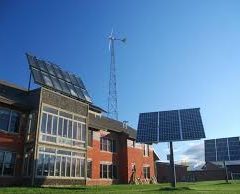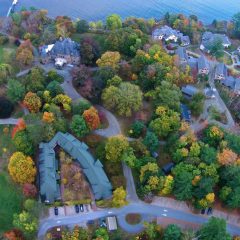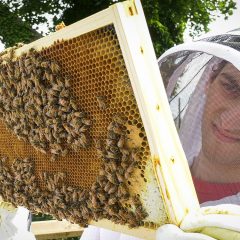Setting the Bar: EcoLeague Institutions Receive Top Ratings in Green Education
With decades of experience in environmental stewardship and sustainability studies, the EcoLeague consortium continues to be a leading innovator in green education. A host of sustainability initiatives at Northland College have placed it on Sierra Magazine’s List of Cool Schools, joining EcoLeague partners and perennial staples atop the rankings, College of the Atlantic (#1 in ’17 and ‘16) and Dickinson College (#6 in ’18, #25 in ’17).
From sustainable food practices and sustainability across curricula to eco-friendly housing, EcoLeague campuses create a holistic educational environment for students, and provide the tools to forge a sustainable future. It is no surprise then, that continued efforts of EcoLeague members to improve curricula and energy consumption were also recognized by the Association for the Advancement of Sustainability in Higher Education (full 2018 rankings here).
While Dickinson College claimed the top spot overall in sustainability for Baccalaureate institutions, Northland College came in at #8. All three aforementioned EcoLeague members were rated in the top ten for curriculum, with College of the Atlantic (CoA) was among the highest rated institutions for campus grounds.
Recent innovations in sustainability at EcoLeague institutions include:
College of the Atlantic
-Approved a comprehensive Discarded Resource and Material Management Policy, a student initiative to achieve 90% diversion of discarded materials campus-wide by 2025.
-At least 75% of COA’s faculty is engaged in sustainability research. More than 35% of the classes offered are related to the environment, sustainability, and social justice.
–Divested from fossil fuels as early as 2013.
-The first college in the U.S. to focus on the relationship between humans and the environment, where each student develops their own course of study in human ecology.
-Created the Community Energy Center to focus on renewable energy efforts in the surrounding community, including the Solar for Businesses and Farms program.
“I believe strongly that being innovative isn’t about chasing ‘the next greatest’ idea, but on focusing our innovations around what we do best and have been doing for nearly five decades—interdisciplinary, experiential education focused on addressing our planet’s most pernicious social and environmental issues,” said COA President Dr. Darron Collins ’92.
Dickinson College
-Completed a new 12,456 panel solar array to help meet Dickinson’s 2020 goal of carbon neutrality.
-New Residence Hall designed to enhance the student residential experience and meet Leadership in Energy and Environmental Design (LEED) Platinum for Homes standards.
-Launched an online Sustainability Dashboard to track energy use on campus.
-Composted 127 tons of food waste in 2017-18 and diverted 51% of their total waste.
-94% of students in the Class of ‘18 took a sustainability course without requirement. A sustainability course is now part of the requirements for a degree at Dickinson.
“Sustainability is part of the academic and co-curricular experience of every Dickinson student,” said Neil Leary, director of the Center for Sustainability Education. “It is also a guiding principle for campus strategic planning and operations.”
Northland College
-More than 80 percent of faculty incorporate sustainability into the classroom
-Composted 96,000 pounds of food waste for 2017/18 school year.
-Spent 46 percent of budget on local foods (within 100 miles of campus).
–Voted to divest from fossil fuels.
-Northland College Student Association purchased 100, 200-watt solar sharesds at Xcel Solar Garden.
-Became Wisconsin’s first Bee Campus as a way to promote pollinators.
“Faculty, staff, and students live the College’s environmental mission every day,” said Scott Grinnell, director of sustainability initiatives at Northland College. “Thinking about how our actions will advance sustainability in all forms—food, water, energy, stewardship, development, diversity, and social justice.”


